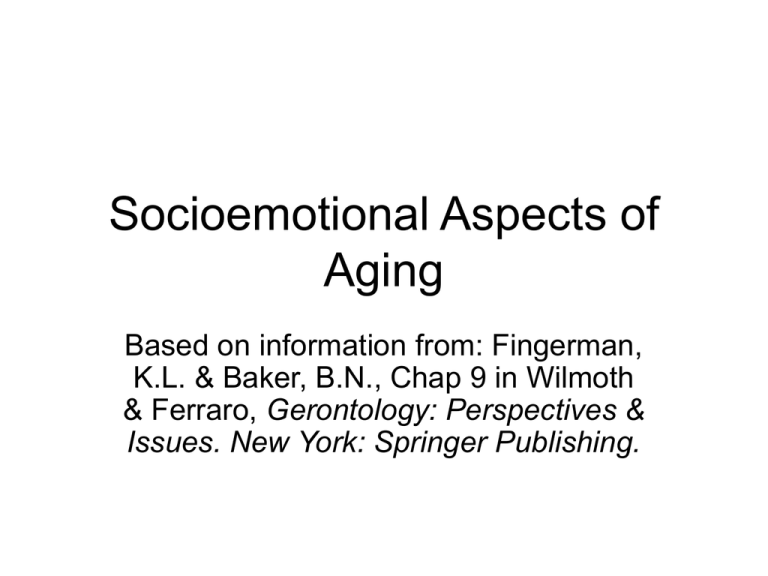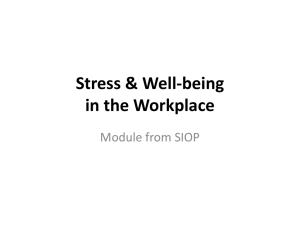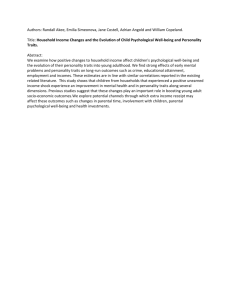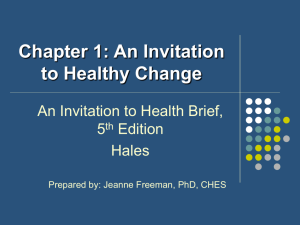PowerPoint Presentation - Socioemotional Aspects of Aging
advertisement

Socioemotional Aspects of Aging Based on information from: Fingerman, K.L. & Baker, B.N., Chap 9 in Wilmoth & Ferraro, Gerontology: Perspectives & Issues. New York: Springer Publishing. • “Prior to the 20th century, extended families dominated an agrarian American economy with family farms.” (p. 183) • Rise of the “nuclear family” • Did we throw Grandma off the train? Who studied what? • Psychologists--early-mid 2th Century: Cognitive Changes in Aging • Sociologists: Variation in O.A.’s relationships as a function of ascribed characteristics • Anthropologists: Cultural aspects Social Ties in Later Life • “Older adults tend to have fewer social partners than younger adults” (p.187) • Why? Is that a bad thing? • An interesting test of the Socioemotional Selectivity Theory: The Hong Kong study • “In sum, evidence indicates that older adults have fewer social partners because they want to spend time with the people they care about most.” (p. 189) Relationships: Problematic Aspects • Why? Possibly emotional regulation • “Hanging out with an older crowd” • Less likely to encounter annoying people • Simply avoid getting upset or avoid annoying situations altogether • In short, we “mellow out”! The Social Input Model of Socioemotional aging (SIMS) • “…focuses on understanding the effects of social relationships on individuals of different ages.” • “Sociologists and public health scholars look @ how social structures, contexts and health contribute to relationship patterns in these situations. For example, sociologists might demonstrate that older individuals with better health or more resources who better adaptation on a variety of measures of physical or emotional functioning.” (p.186) For Your Consideration—A Couple of Examples • Schwirian, K.P. & Schwirian, P.M. (1993). Neighboring, residential satisfaction, and psychological well-being in urban elders. Journal of Community Psychology, 21 (285-99) • Schwirian, P.M., Schwirian, K.P. & Weiss, C.H. (1995). Health behaviors, life orientation, and health decline among older adults. Journal of Mental Health & Aging. 1 (111-125) Theoretical Background: Psychological Well-Being • A multi-dimensional concept • Incorporates an evaluation of and estimate of satisfaction with both past and present life and life events. Background: Residential Satisfaction • The residential context for older adults is composed of many natural, social, and person-made features. • Some sociologists argue: The subjective environment is more important to psychological well-being than is the objective environment. Background: Neighboring • One form of social support • Can be: – A significant community resource to older women who live alone – Part of the help network as health deteriorates Background: Personal Resources • “The basic premise of this paper is that residential satisfaction and neighboring contribute positively to the psychological well-being of urban elders. However, we also assert that their importance can only be fully understood when personal resources are taken into account as well.” (p. 288) Personal Resources, cont’d • Multidimentional SES Health Mobility The Study: • WHO? Random sample of 254 persons 60 y.o. and over in CMH SMSA • Two-stage approach: random digit dial w/ follow-up mailed questionnaire The Study: cont’d • The Variables • Dependent: psychological well-being • Independents: personal resources; residential satisfaction; neighboring; • Control: age; race; sex The Study, cont’d • Analysis: • Structural equation modeling using Bentler’s EQS program. What We Found • “Thus, with personal resources in the equation, residential satisfaction, neighboring, and race do not have significant effects of psychological wellbeing. It appears that whatever effects were observed were due to the mutual association of psychological well-being and the neighborhood variables to personal resources.” Another Example for your condsideration: • Schwirian, Schwirian, & Weiss (1995). Health Behaviors, Life Orientation & Health Decline Among Older Adults • This paper addresses a central issue in the health of older adults: the extent to which elderly people forestall health decline by engaging in positive health behaviors and maintaining a positive outlook on life. The Study • WHO? 138 of the 254 o.a.’s in the first study. • The VARIABLES: – Dependent: Health Decline – Independent: Health Behavior (SLS) & Life Orientation (psych. Well-being & psych hardiness) – Control: Health @ Time 1; age; marital status; sex; SES; race What We Found • “Health behaviors and outlook on life for these older adults had a positive effect on their health—at least as the respondents saw it.”





